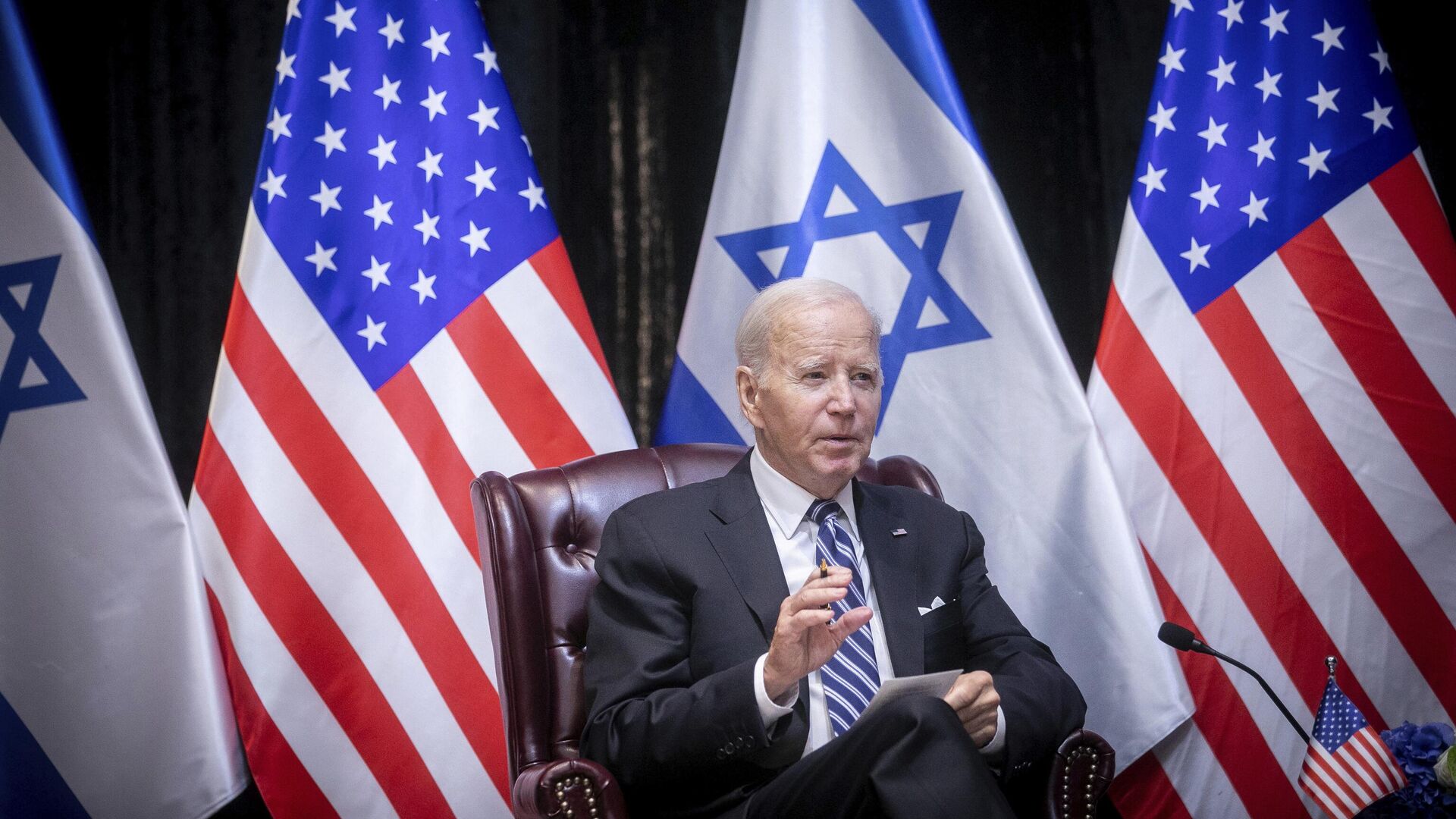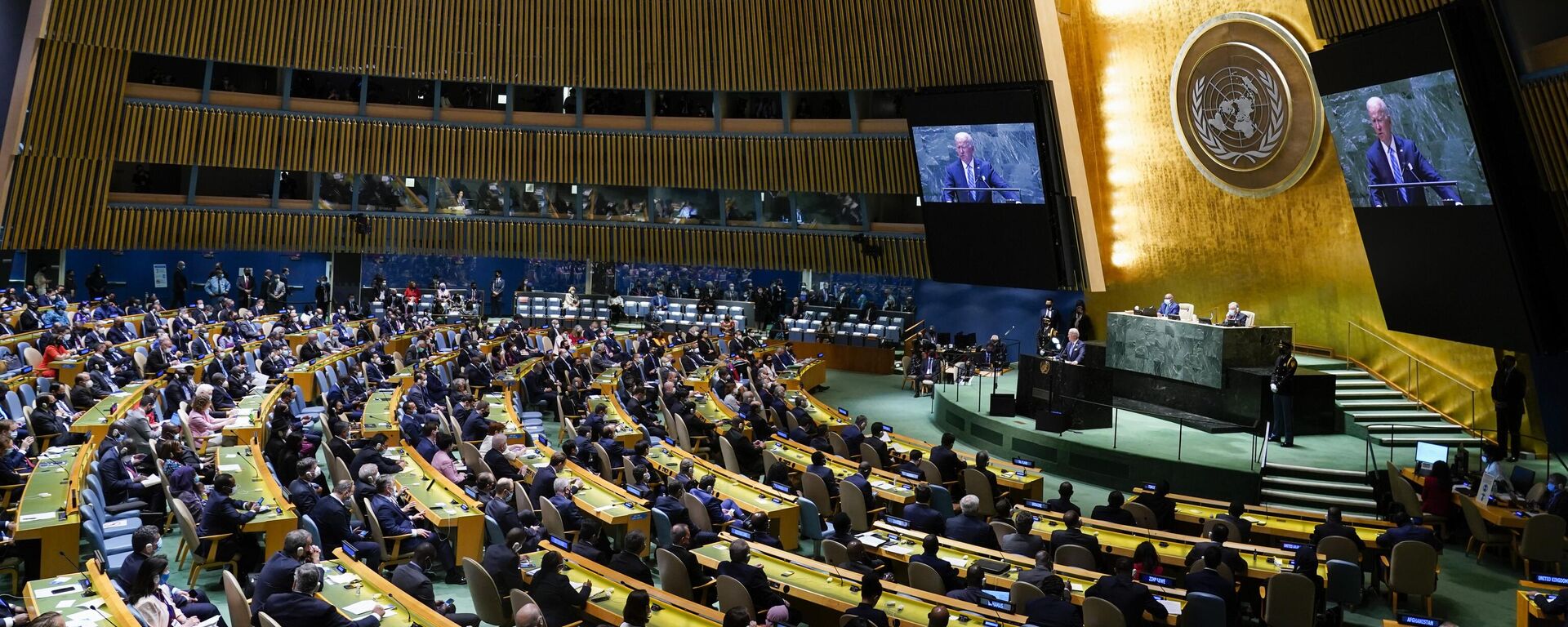https://sputnikglobe.com/20240416/us-defense-of-israel-shows-west-has-never-been-committed-to-international-law-1117951888.html
US Defense of Israel Shows West 'Has Never Been Committed' to International Law
US Defense of Israel Shows West 'Has Never Been Committed' to International Law
Sputnik International
Economist Radhika Desai said the United States’ unwavering defense of Israel’s deadly Gaza campaign proves the West is merely interested in upholding historic patterns of colonial subjugation and domination.
2024-04-16T04:26+0000
2024-04-16T04:26+0000
2024-04-16T05:06+0000
opinion
garland nixon
israel
nato
the united nations (un)
un security council (unsc)
the critical hour
imperialism
us imperialism
colonialism
https://cdn1.img.sputnikglobe.com/img/07e8/04/10/1117952744_0:278:3072:2006_1920x0_80_0_0_50ded050643eb9ffef93eabcd224c55c.jpg
“Western powers never believed in a rules-based order,” declared author and international law expert Richard Falk in a blog post on the Pearls and Irritations website Monday.The noted professor at Princeton University disparaged the United States’ foreign policy since the end of the Cold War, also criticizing its modern alliances with “special allies, such as Israel, Taiwan and Ukraine, no matter how deeply they challenged international law and evaded peaceful settlement procedures.”“The aftermath of the Cold War led to an era of geopolitical unilateralism,” concluded Falk.Economist Radhika Desai assigned another word to US foreign policy: imperialism. The author and researcher responded to Falk’s article Monday on Sputnik’s The Critical Hour program.“Richard Falk is one of the most respected progressive thinkers in the US,” conceded Desai. “I suppose when I say the most respected it means he has a wide audience, and you can see that you can't really have a wide audience in the United States unless you make a lot of compromises.”Desai challenged Falk’s claim that the West wanted to create a world order genuinely rooted in respect for the sovereignty of other countries, insisting the colonial powers were unwilling to give up their global hegemony.“The only reason the West was forced to at least pay lip service to doing that is because, number one, it couldn't have won the Second World War without the critical aid of the Soviet Union and Chinese forces,” the economist claimed. “And, number two, because the developing world or what was then the colonized world was up in arms and the imperialism there had to end. So they had to appear to do this.”Desai claimed the creation of Western-led institutions like NATO was designed to offer an alternative to the more egalitarian United Nations and its conception of international law. Through institutions like NATO the United States and its allies could continue to “make the rules as we go along,” she argued.Although frequently billed as a “defensive” alliance, the end of the Cold War and the United States’ status as the lone global superpower allowed NATO to undertake a number of openly offensive military operations. NATO played a role in Western operations in Iraq, Afghanistan, and Libya, but has perhaps been most criticized for its destructive role in the former Yugoslavia.NATO’s 1999 bombing of Belgrade, which came on the heels of its 1995 campaign in Bosnia and Herzegovina, was conducted in open defiance of international law after the United Nations Security Council vetoed the alliance’s proposed action. Hundreds of civilians were killed in the assault while increased rates of cancer and birth defects are still observed decades later after NATO’s use of radioactive depleted uranium in the operation.“I think what's really emerging now is how the US has never been committed to anything vaguely like the United Nations Charter and anything vaguely like international law,” Desai claimed as the Biden administration has repeatedly undermined the UN in recent months in its “ironclad” defense of Israel’s Gaza campaign.Host Garland Nixon agreed with Desai’s analysis, offering his view “through the lens of a Black person in America.”“Most Western countries did not become democratic until after the Second World War,” Desai observed. “The attempt to impose democracy [in Germany] after the First World War led more or less immediately to the rise of fascism because the elite was simply not prepared for popular power, and Hitler could never have come to power unless the elite supported him.”“The fact of the matter is you can't talk about geopolitics,” she concluded. “You've got to talk about geopolitical economy. Because what do you think all this militarism is about? It's about essentially materiel or economic plunder, oppression, subordination, etcetera. So let's call it what it is. The word imperialism very tidily encompasses that whole range of phenomena.”
https://sputnikglobe.com/20240326/united-states-mocking-international-law-creating-world-of-the-jungle-1117569610.html
https://sputnikglobe.com/20240325/anti-nato-rally-in-belgrade-starts-with-moment-of-silence-for-moscow-terror-attack-victims-1117533023.html
https://sputnikglobe.com/20231203/kissinger--the-americas-how-the-us-built-order-on-the-ashes-of-genocide-1115362379.html
israel
belgrade
Sputnik International
feedback@sputniknews.com
+74956456601
MIA „Rossiya Segodnya“
2024
John Miles
https://cdn1.img.sputnikglobe.com/img/07e8/01/19/1116388787_0:0:1316:1316_100x100_80_0_0_77e70d36afd983012b1c5d38ddb84156.jpg
John Miles
https://cdn1.img.sputnikglobe.com/img/07e8/01/19/1116388787_0:0:1316:1316_100x100_80_0_0_77e70d36afd983012b1c5d38ddb84156.jpg
News
en_EN
Sputnik International
feedback@sputniknews.com
+74956456601
MIA „Rossiya Segodnya“
Sputnik International
feedback@sputniknews.com
+74956456601
MIA „Rossiya Segodnya“
John Miles
https://cdn1.img.sputnikglobe.com/img/07e8/01/19/1116388787_0:0:1316:1316_100x100_80_0_0_77e70d36afd983012b1c5d38ddb84156.jpg
us defends israel, us-israel alliance, us-israel cooperation, us protects israel, israel controls us, us is israel's puppy, radhika desai imperialism, radhika desai us foreign policy, radhika desai nato, us defending israel, united states international law, nato vs united nations, united states imperialism, united states colonialism, iran's drone, missile attack on israel, iran's operation, true promise, iran israel relations, iran strikes israel, iran carries out retaliatory attack on israel, iran's airborne strike on israel
us defends israel, us-israel alliance, us-israel cooperation, us protects israel, israel controls us, us is israel's puppy, radhika desai imperialism, radhika desai us foreign policy, radhika desai nato, us defending israel, united states international law, nato vs united nations, united states imperialism, united states colonialism, iran's drone, missile attack on israel, iran's operation, true promise, iran israel relations, iran strikes israel, iran carries out retaliatory attack on israel, iran's airborne strike on israel
US Defense of Israel Shows West 'Has Never Been Committed' to International Law
04:26 GMT 16.04.2024 (Updated: 05:06 GMT 16.04.2024) Economist Radhika Desai said the United States’ unwavering defense of Israel’s deadly Gaza campaign proves the West is merely interested in upholding historic patterns of colonial subjugation and domination.
“Western powers never believed in a rules-based order,” declared author and international law expert Richard Falk in
a blog post on the Pearls and Irritations website Monday.
The noted professor at Princeton University disparaged the United States’ foreign policy since the end of the Cold War, also criticizing its modern alliances with “special allies, such as Israel, Taiwan and Ukraine, no matter how deeply they challenged international law and evaded peaceful settlement procedures.”
“The aftermath of the Cold War led to an era of geopolitical unilateralism,” concluded Falk.
Economist Radhika Desai assigned another word to US foreign policy:
imperialism. The author and researcher responded to Falk’s article Monday on
Sputnik’s The Critical Hour program.
“Richard Falk is one of the most respected progressive thinkers in the US,” conceded Desai. “I suppose when I say the most respected it means he has a wide audience, and you can see that you can't really have a wide audience in the United States unless you make a lot of compromises.”
“And so what frustrates me about this article is that while it reaches a perfectly good conclusion that I agree with, which is that the United States’ support for Israel is leading to the current genocide in Gaza, etcetera, the fact is that he, in arriving at it, makes so many compromises.”
Desai challenged Falk’s claim that the West wanted to create a world order genuinely rooted in respect for the sovereignty of other countries, insisting the colonial powers were unwilling to give up their global hegemony.
“The only reason the West was forced to at least pay lip service to doing that is because, number one, it couldn't have won the Second World War without the critical aid of the Soviet Union and Chinese forces,” the economist claimed. “And, number two, because the developing world or what was then the colonized world was up in arms and the imperialism there had to end. So they had to appear to do this.”
“After paying lip service to this, they couldn't win, they had to create a United Nations,” she continued. “And even though they managed to win the Security Council – the permanent five rule – which allows a small number of countries a veto of what the rest of the UN decides, they had to include in it Russia and China. So they hated the United Nations and that's why they went off and created NATO.”
Desai claimed the creation of Western-led institutions like NATO was designed to offer an alternative to the more egalitarian United Nations and its conception of international law. Through institutions like NATO the United States and its allies could continue to “make the rules as we go along,” she argued.
Although frequently billed as a “defensive” alliance, the end of the Cold War and the United States’ status as the lone global superpower allowed NATO to undertake a number of openly offensive military operations. NATO played a role in Western operations in Iraq, Afghanistan, and Libya, but has perhaps been most criticized for its destructive role in the former Yugoslavia.
NATO’s 1999 bombing of Belgrade, which came on the heels of its 1995 campaign in Bosnia and Herzegovina, was conducted in open defiance of international law after the United Nations Security Council vetoed the alliance’s proposed action. Hundreds of civilians were killed in the assault while
increased rates of cancer and birth defects are
still observed decades later after NATO’s use of radioactive depleted uranium in the operation.
“I think what's really emerging now is how the US has never been committed to anything vaguely like the United Nations Charter and anything vaguely like international law,” Desai claimed as the Biden administration has
repeatedly undermined the UN in recent months in its “ironclad” defense of Israel’s Gaza campaign.
Host Garland Nixon agreed with Desai’s analysis, offering his view “through the lens of a Black person in America.”
“They were still literally hanging Black people for trying to vote in this 'victorious democracy,'” Nixon noted, criticizing Falk’s characterization of the United States after World War II. “
Operation Gladio and all of the countries all over
Latin America and South America, they were thrilled. When I read this, I think I don't know what this guy's talking about. It's clearly, obviously, absurd imperialist propaganda.”
“Most Western countries did not become democratic until after the Second World War,” Desai observed. “The attempt to impose democracy [in Germany] after the First World War led more or less immediately to the rise of fascism because the elite was simply not prepared for popular power, and Hitler could never have come to power unless the elite supported him.”
“In the United States, thanks to the Jim Crow laws that still pervaded all over the southern United States, it actually took the Civil Rights Movement to achieve even simple, ordinary, limited universal adult franchise in a meaningful way,” she added. “So if you think about it, the United States did not become democratic until the 1970s.”
“The fact of the matter is you can't talk about geopolitics,” she concluded. “You've got to talk about geopolitical economy. Because what do you think all this militarism is about? It's about essentially materiel or economic plunder, oppression, subordination, etcetera. So let's call it what it is. The word imperialism very tidily encompasses that whole range of phenomena.”

3 December 2023, 17:24 GMT






